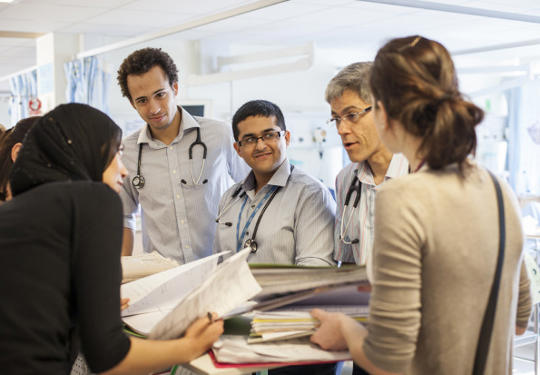In the first of our new Spotlight on local innovation series of articles, we hear from colleagues at Buckinghamshire Healthcare NHS Trust where a structured and compassionate programme is helping international medical graduates (IMGs) to settle, thrive and progress.
Dr Aslihan Tapan, a medical education fellow at Stoke Mandeville Hospital, explains what they’ve achieved so far.
In 2023, over two thirds (68%) of doctors who joined the UK workforce were IMGs. This increasingly vital group deserves our proactive support – not only because it's the right thing to do, but also because their retention and wellbeing are essential for the sustainability of patient care and the wider NHS. I firmly believe that supporting IMGs properly is not a luxury – it’s a long-term investment in people and the future of the NHS.
'Healthcare bodies and employers should build capacity to integrate new starters properly. However, there will inevitably be additional work for more experienced doctors to make sure their new colleagues integrate well and can contribute effectively in the short and medium term.' (GMC, 2024)
I was born in London and studied medicine in Istanbul, so my own experience of returning to the UK as an IMG gave me first-hand insight into the challenges new international colleagues face – from navigating NHS systems and communication styles to building confidence in unfamiliar cultural settings.
Most difficulties faced by IMGs are not about their clinical knowledge, but tend to be practical or cultural obstacles to fitting in. Many IMGs are unfamiliar with NHS acronyms, local systems and referral pathways. Even idioms and clinical shorthand – from 'take that with a pinch of salt' to 'referral to SALT' – can be confusing. Some IMGs worry about being misunderstood or perceived as rude in handovers, which highlights the importance of a welcoming culture and proactive inclusion.
'It is important that those who work in the UK’s healthcare systems have adequate training systems and policies to promote inclusive behaviours that recognise the challenges for those new to the workforce and to living in the UK.' (GMC, 2024)
Buckinghamshire has developed a multi-layered programme combining induction, mentoring and pastoral care.
- The IMG handbook is being refreshed with key terms, abbreviations and local guidance.
- Monthly forums cover topics from portfolio development to clinical case discussions.
- Simulation and refresher sessions help rebuild confidence in skills such as cannulation.
- A buddy system and WhatsApp group provide ongoing peer support.
- Communication masterclasses and pastoral one-to-one meetings offer space for personal and professional reflection.
We take a proactive approach, checking in often with IMGs in the weeks after arrival to ensure they are settling in. 11 new IMGs recently joined our acute medicine department, receiving excellent feedback. We now plan to track their educational outcomes and career progression to understand the long-term impact of the support we’re offering them.
Collaboration extends beyond the trust: the trust works with the Cultural and Diversity Inclusion Network in Oxford and other Thames Valley partners to ensure consistent regional induction and shared learning. Our goal is simple. We want to create an environment where IMGs feel welcome and never hesitate to seek help.
What’s next?
Our future plans include departmental IMG champions, academic half-days using simulated ethical scenarios, and reflective ‘spill the tea sessions’ modelled on medical student groups. Career guidance and mock interviews will be added to strengthen understanding of UK training routes, alongside welcome packs to help new doctors feel valued.
Colleagues across the trust have praised the model as an example of meaningful, institutionally backed inclusion. National data has shown that IMGs are disproportionately involved in disciplinary processes – we want to help prevent this risk with early support.
We want to develop and expand this work to reach IMGs working in other trusts. After all, our approach in Buckinghamshire shows how structured induction, mentorship, simulation and pastoral care can build confidence, improve retention and strengthen patient safety.
Your RCP membership, local to you
RCP hospital visits are an importance part of our ongoing programme of regional engagement. Our aim is to listen to members and fellows across the UK and support them to deliver high-quality patient care.
Supported by our dedicated regional membership team, our 18 networks across England, Wales and Northern Ireland provide members and fellows with access to events, CPD, training and conferences close to home and offer opportunities to connect with other physicians, external stakeholders and RCP officers. Our RCP regional advisers, college tutors and associate college tutors ensure that regional issues are heard at a national level.
- Learn more about the work of RCP UK nations and regions
- Learn more about the RCP’s work in Oxford and Thames Valley
Liked this? You might enjoy…
- RCP president visits Stoke Mandeville Hospital to meet with fellows and members
- Pilot programme aims to better integrate locally employed IMGs into the NHS
- My journey as an IMG in the NHS and the lessons learned
- IMGs: supporting the backbone of the NHS
- How one IMG achieved her lifelong dream to work in the NHS
- The power of mentorship: reflections on my journey as an IMG
- Using data to tackle inequalities in medicine
- RCP welcomes refugee doctors to the UK with a year of free membership






